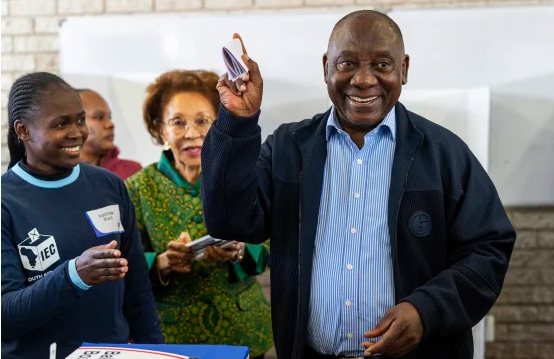Partial results from the recent national election indicate that the African National Congress (ANC) is on course to lose the parliamentary majority it has held for 30 years.
With results in from 11.3% of polling stations, the ANC’s share of the vote stands at 42.8%, while the Democratic Alliance (DA) has 25.6%, and the Economic Freedom Fighters (EFF) have 8.3%, according to data from the Electoral Commission.
If the final results mirror the early data, the ANC will be compelled to form a coalition with other parties to govern, potentially leading to unprecedented political volatility.
[ African National Congress Ready To Dump Johannesburg Economic Freedom Fighters ]
The Council for Scientific and Industrial Research projects the ANC to secure around 42% of the vote. In comparison, the ANC won 57.5% of the vote in the 2019 election, with the DA and EFF garnering 20.8% and 10.8% respectively, on a voter turnout of 66%, which is expected to be higher this year.
Under the constitution, the newly elected National Assembly will elect the next President. Despite the ANC likely remaining the largest party, Cyril Ramaphosa may face internal leadership challenges due to the party’s poor performance.
The ANC’s support has dwindled since the end of apartheid, attributed to high unemployment, crime, frequent power outages, and corruption.
The early results highlight regional dynamics, with the ANC at 37.8%, the DA at 28.2%, and the EFF at 11.1% in Gauteng.
In KwaZulu-Natal, former President Jacob Zuma’s MK party is performing strongly with 42.3% of the vote compared to the ANC’s 20.1%. Zuma’s departure from the ANC has influenced voter behaviour in the region, costing both the ANC and EFF votes.
The Electoral Commission has seven days to declare full results, but it is typically faster. The new parliament must convene within 14 days of the final results and elect the nation’s President.
This period could involve intense negotiations to form a new government if the ANC loses its majority. The rand fell 1% against the US dollar in early Johannesburg trade, hitting its weakest level in four weeks.
Catch up with the latest news from The Times Post on WhatsApp by following our channel. Click here to join.
Kindly follow @thetimespost on Instagram. On X (Twitter), follow @thetimespost2.


